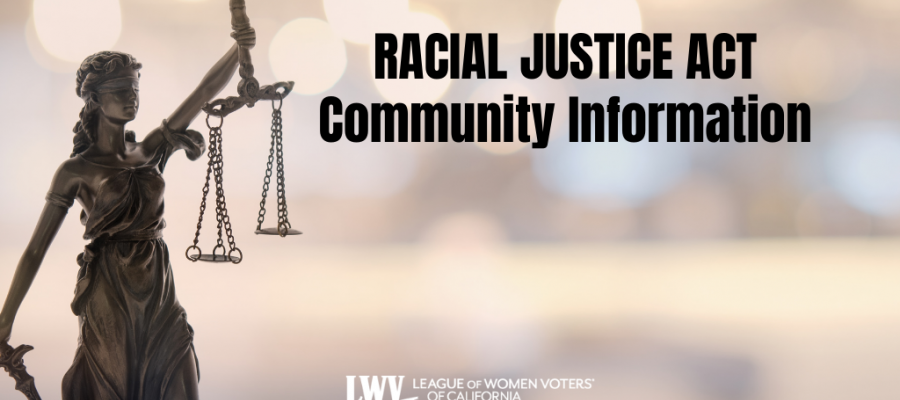
The Caifornia Racial Justice Act is landmark legislation that prohibits the state from seeking or obtaining a criminal conviction, or from imposing a sentence, based on race, ethnicity or national origin. This bill was initially set aside due to the effects of COVID, but was revived through intensive advocacy in the closing days of the Legislative session and signed into law by the Governor.
The bill will specifically address:
- Intentional bias directed at the defendant by an attorney, judge, juror, law enforcement officer or expert witness.
- Racially coded language used in court, for example, prosecutors comparing the defendant to an animal in closing argument.
- Racial disparities in charges and convictions.
- Racial disparities in sentences.
The California Racial Justice Act will allow a defendant to file a motion at trial or following conviction challenging racial discrimination in their case based on one of these five grounds. If the defendant proves the discrimination occurred, then the case will be sent back for a new trial, or the judge can adjust the charges or sentence in the interest of justice.
How will this be implemented in California communities? Check out our recent community training webinar.
Frequently Asked Questions:
What is the California Racial Justice Act (RJA)?
This is a new law that makes it illegal for the state to pursue or get a criminal conviction or “sentence” (a particular punishment) based on an individual’s race, ethnicity, or national origin. Under the new law, the courts will no longer require proof of purposeful discrimination directed at the individual to challenge discrimination in charges and sentencing. This means that instead of focusing on someone’s intent to act in a discriminatory way, the law focuses on whether racial bias happened.
What can be challenged under the RJA?
The RJA allows someone to challenge four kinds of racial discrimination in criminal courts: (1) bias exhibited directly towards the defendant by a judge, juror, attorney, expert witness, or law enforcement person involved in the case; (2) racially discriminatory language used in court during a trial; (3) racial “disparities” (differences or inequalities) in the sorts of criminal charges brought against someone or the convictions that are imposed; and (4) racial disparities in sentencing.
Who has access to file this motion?
The Racial Justice Act is a prospective only law - which means that it only applies to cases where the judgment was not final before January 1, 2021. It applies to people who are at the charging and sentencing stages of the legal process. The RJA motion may be filed by the defendant with the courts at any stage of the trial before sentencing. If the defendant makes a “prima facie” showing that racial discrimination impacted the case, then the RJA requires the court to hold a hearing to determine if a violation of the RJA has occurred.
What does “prima facie” showing mean?
Prima facie showing is a legal term for the courts to decide whether there is a “substantial likelihood” that a violation under the Racial Justice Act occurred. If the court finds that there was a substantial likelihood the violation happened, then it must hold a hearing and decide whether the criminal charges and/or sentence are based on race, ethnicity, or national origin.
What evidence will I need to show to qualify for a RJA motion?
The RJA motion will need to include evidence that the charges or sentence are based on explicit or implicit bias relating to an individual’s race, ethnicity, or national origin. This includes evidence that:
- An attorney, judge, expert witness, juror, or law enforcement officer involved in the case exhibited bias or prejudice directed toward the defendant. This includes behavior both inside and outside of court.
- During the trial and within the courtroom, an attorney, judge, expert witness, juror, or law enforcement officer involved in the case used racially discriminatory language. This includes “racially-coded” language (where the underlying meaning shows bias), in addition to obviously racist statements. The statements do not need to be directed toward the defendant.
- Statistical “disparities” (inequalities or differences) in the level or seriousness of the charges or convictions within your county based on race, ethnicity or national origin. In other words, data to support that you were given more severe criminal charges or a more severe conviction than another individual with similar circumstances and facts of the case.
- Statistical “disparities” (inequalities or differences) in sentencing within your county based on race, ethnicity or national origin of the defendant or the victim. In other words, data to support that you were given a more severe sentence than another individual with similar circumstances and facts of the case.
What is a Preponderance of the Evidence?
A preponderance of the evidence is a legal term that establishes the standard of proof that the courts will use at the RJA hearing. It requires that the evidence and facts presented have to show that the claim being made is more likely to be true than not true.
What remedy can I expect from an RJA motion?
Once you file a motion under the Racial Justice Act, the court will determine if a preponderance of the evidence shows that race, ethnicity, or national origin impacted the case. If a violation is found the judge may:
- Dismiss the existing jury panel and re-start jury selection;
- Declare a mistrial, if requested by the defendant;
- If the court determines that it would be in the interest of justice, reduce one or more charges, or dismiss enhancements, special circumstances, or special allegations, or reduce the sentence; and
- If the case involves the death penalty, the individual would no longer be eligible for the death penalty.
Is the judge required to set a hearing for my RJA motion?
Yes, if you make a prima facie showing. Then, the Racial Justice Act requires a hearing on the motion and for the judge to make their findings on the record. But that does not guarantee a favorable result.
I am a juvenile? Do I have access to an RJA motion in juvenile court?
Yes, a juvenile can file a motion under the Racial Justice Act.
I am formerly incarcerated, can I file an RJA motion?
Right now, the RJA only applies prospectively, to cases where the judgment was not final before January 1, 2021. If your conviction occurred after this date, then you can file an RJA challenge through a petition for habeas corpus.
If I don’t have an attorney, do I have a right to court-appointed counsel?
For people who have already been convicted and want to file a challenge under the RJA, they can request that an attorney be appointed but it is not guaranteed in all cases. An attorney will be appointed if the court concludes the individual has made a prima facie showing or if requested by the State Public Defender.
Who should I contact if I believe that my case qualifies under the Racial Justice Act?
Contact the California Office of the State Public Defenders to be connected with an attorney in your county, cpda.org/County/CountyPDWebSites.html.


